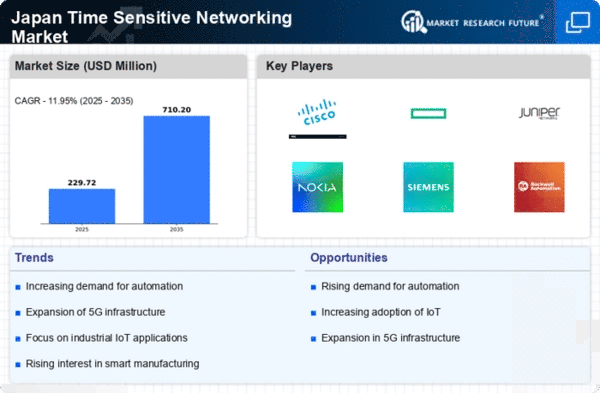Emergence of Smart Cities
The emergence of smart cities in Japan is a pivotal driver for the Time Sensitive Networking Market. Urban areas are increasingly adopting smart technologies to improve infrastructure, transportation, and public services. The integration of time sensitive networking is essential for the effective functioning of smart city applications, such as traffic management systems and public safety networks. With the Japanese government investing approximately ¥1 trillion in smart city initiatives, the demand for advanced networking solutions is expected to rise. This investment not only enhances urban living but also creates a conducive environment for the growth of the time sensitive-networking market, as cities strive to become more interconnected and efficient.
Growing Focus on Cybersecurity
As the Time Sensitive Networking Market expands in Japan, the focus on cybersecurity becomes increasingly critical. With the rise of interconnected systems, the potential for cyber threats escalates, prompting organizations to prioritize the security of their networks. The Japanese government has recognized this challenge and is implementing stringent cybersecurity regulations to protect critical infrastructure. Reports indicate that cybersecurity spending in Japan is projected to reach ¥1 trillion by 2026, reflecting the urgency of safeguarding time sensitive networking systems. This heightened emphasis on security not only influences the design and implementation of networking solutions but also drives innovation within the time sensitive-networking market, as companies seek to develop secure and resilient systems.
Government Initiatives and Support
Government initiatives in Japan play a crucial role in fostering the development of the Time Sensitive Networking Market. The Japanese government has launched various programs aimed at promoting digital transformation across industries. For instance, the 'Society 5.0' initiative emphasizes the integration of advanced technologies, including time sensitive networking, to create a more connected and efficient society. Financial support and incentives for research and development in this sector are also evident, with the government allocating approximately ¥100 billion to enhance digital infrastructure. Such initiatives not only stimulate innovation but also encourage collaboration between public and private sectors, thereby strengthening the overall ecosystem of the time sensitive-networking market.
Advancements in Industrial Automation
The Time Sensitive Networking Market in Japan is significantly influenced by advancements in industrial automation. As industries increasingly adopt automation technologies, the demand for reliable and efficient networking solutions rises correspondingly. The integration of time sensitive networking protocols enables seamless communication between automated systems, enhancing productivity and reducing operational costs. Reports indicate that the industrial automation sector in Japan is projected to grow at a CAGR of 8% over the next five years, further driving the need for robust networking solutions. This trend suggests that the time sensitive-networking market will continue to expand as companies seek to optimize their automated processes and improve overall efficiency.
Rising Demand for Real-Time Data Processing
The time sensitive-networking market in Japan experiences a notable surge in demand for real-time data processing capabilities. Industries such as manufacturing and telecommunications increasingly rely on instantaneous data transmission to enhance operational efficiency. This trend is underscored by the fact that approximately 70% of Japanese manufacturers are integrating real-time analytics into their production processes. The need for low-latency communication systems is paramount, as organizations seek to minimize delays that could hinder productivity. Consequently, the time sensitive-networking market is poised for growth, driven by the necessity for rapid data exchange and decision-making. As companies strive to maintain competitive advantages, investments in advanced networking technologies are likely to escalate, further propelling the market forward.
















